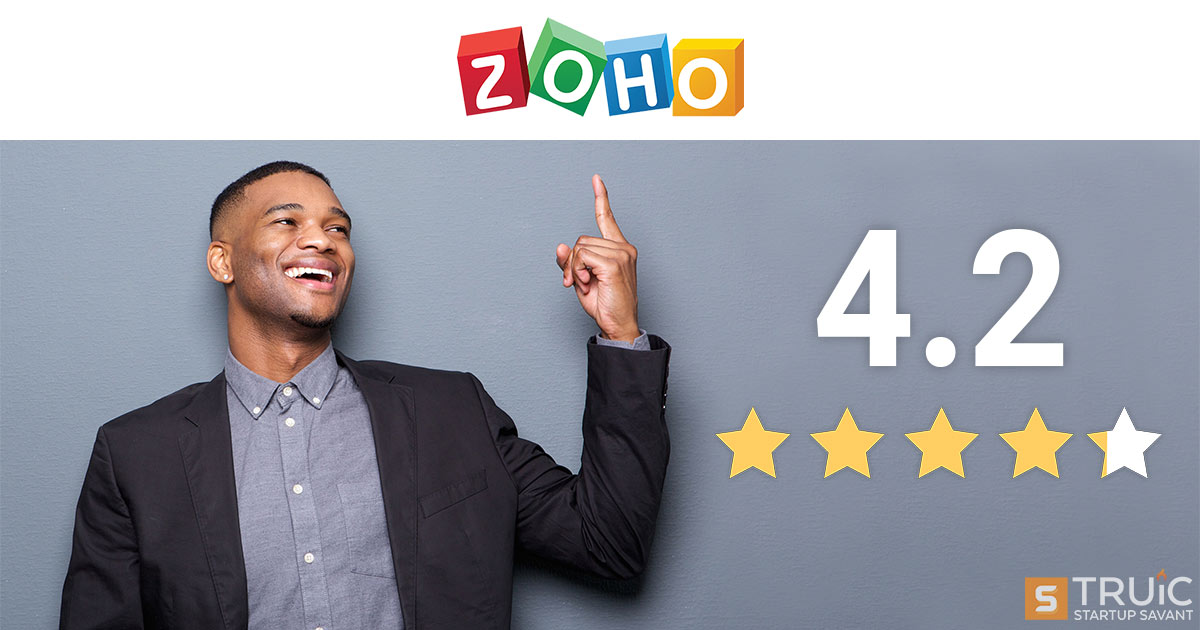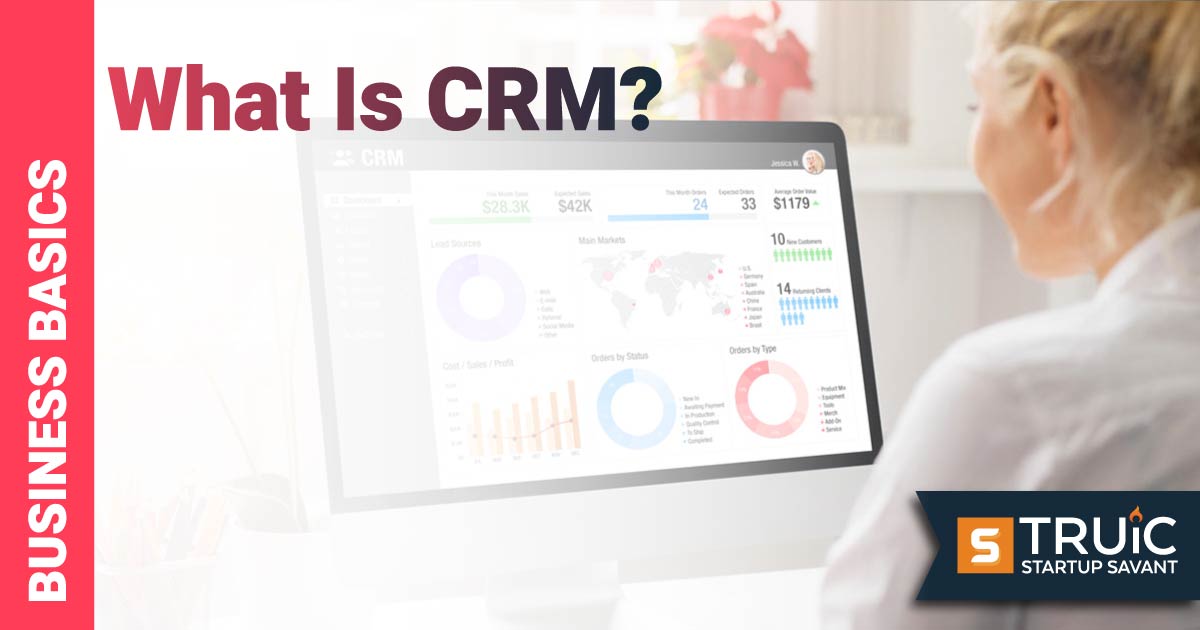Zoho CRM Review 2024
Is It the Best CRM Software?

Last Updated: By TRUiC Team
As the owner of a startup, you want to invest in software that works for your business, your team, and your processes. Customer relationship management plays a critical role in effectively managing and driving business growth, so picking the best CRM software in 2024 is key.
Zoho has created a great CRM software product, but is it the best CRM for startups?
To help you answer that, we’ve created a simple guide exploring the pros and cons of working with Zoho and how it matches up against the top CRMs. Read on for our Zoho CRM review.
Recommended: Get started with Zoho today.
Pros and Cons of Zoho CRM
Zoho CRM software can bring your entire customer-facing team together, optimize and automate processes, and help you maximize productivity to create a seamless customer experience. But even the best CRM software has its drawbacks. See below for a snapshot of the pros and cons of Zoho CRM software for startup businesses.
Pros of Zoho CRM Software
- AI-powered analytics
- Highly customizable
- Feature-rich
- Competitively priced
Cons of Zoho CRM Software
- Customer support delays
- Onboarding is harder for advanced plans
Zoho CRM Pricing and Features
Zoho offers a free plan with limited features for those looking for a zero-commitment CRM. After that, Zoho offers three-tiered, budget-friendly paid plans. But keep in mind—the monthly cost shown is per user when you sign up for a one-year plan.
Free CRM
Notable Features:
- Contact management
- Track lead activity
- Customer analytics
- Workflow automation
- Create charts and reports
Standard ($14/User/Month)
Notable Features:
- Complete sales cycle view
- Manage multiple sales pipelines
- Sales forecasting
- Limited custom reports and dashboards
- Lead scoring
Professional ($23/User/Month)
Notable Features:
- Action automation
- Real-time customer interaction
- Unlimited custom reports and dashboards
- Automatic lead assignment
- More security customization options
Enterprise ($40/User/Month)
Notable Features:
- Advanced customization options
- Email data capture
- Private customer portals
- Customer Command Center
- Anomaly detectors
Ultimate ($52/User/Month)
Notable Features:
- Zoho Analytics
- Business intelligence tools
- Manage large organizations with multiple departments
- More customizations
- Additional templates, forms, and layouts
- Enterprise-grade data security processes
Zoho CRM Reviews
You now have an overview of Zoho’s pricing structure and most important features, but if you’re still unsure, let’s hear from Zoho's customers themselves.
Here are some verified reviews from TrustRadius by people who used Zoho CRM:
“We use Zoho CRM for the tracking of leads and sales funnels and also customer relationship management. The tool is great for providing the small insights that are required when you are working with a huge number of leads. We also use it to regulate our follow-ups and lead acceleration activities.”
“For looking after a customer database including clients, prospects and ongoing deals Zoho is ideal. It helps your team to forecast deal amounts, closing dates and progress. As well as the nitty gritty such as managing individual prospects for lead generation initiatives. It's less well rounded than HubSpot's CRM that seems to be more all-encompassing.”
“It helps in monitoring of various processes across organizations. From collecting customer data to monitoring it and using it for sales and market research Zoho CRM is very useful. It is an excellent tool to run your business on the internet with functions and features helpful for improving sales figures and performance. It helps in lead generation and the development of quality leads.”
Startups and small- to medium-sized businesses find Zoho to be an important tool that helps capture sales leads and ensure their opportunities aren’t missed. Zoho’s customers also report that the software helps organize team efforts across complex processes. Lastly, users appreciate the insights and analytics provided by Zoho CRM and find that they help them make important decisions.
On the flip side, some customers feel that Zoho’s features aren’t as complete as the features offered by some of the other top CRM software providers. Features offered can vary significantly depending on what plans users have opted for and what integrations they have added.
How Does Zoho CRM Compare?
There are plenty of competitors out there that offer CRM software for startups. One of the more popular is HubSpot. We find that Zoho compares to HubSpot in the following ways:
Pricing
Both Zoho and HubSpot offer a free CRM plan, with HubSpot's free plan covering unlimited users. After that, both offer priced plans tiered by features and based on the number of users. Expect to pay more if you opt for a monthly over yearly subscription.
HubSpot offers a Starter plan for two users for $45/month or a Professional plan at $450/month for up to five users. Large businesses can opt for the Enterprise plan for 10 users at $1,200/month with a $120 fee for each additional user. Zoho, meanwhile, has four-tiered plans ranging from $14/month to $52/month. So, even when you consider that their monthly charges are on a per-user basis, Zoho’s CRM software still comes out on top for affordability.
Features
Hubspot and Zoho both offer impressive features that can help you run and grow your startup business efficiently. Hubspot allows you to manage unlimited contacts, automate sales processes, gather data and analytics, and use basic AI tools. Zoho offers advanced workflow automation and process optimization, broad customer management tools, rich dashboard options, and predictive sales.
Bottom line? Both Zoho and Hubspot include all the features needed to manage CRM for most businesses effectively. Still, when it comes to advanced features, like marketing capabilities, HubSpot pulls ahead because of its more well-rounded offerings.
Ease of Use
Zoho’s CRM software has an easy-to-use main screen with well-organized tabs and prominent action buttons. Many Zoho customers report finding the software to be user-friendly, especially for lower-tiered plans. It can, however, at times have a more dated feel to it, and some users complain that with the higher-tiered Zoho plans, it loses some of its ease of use.
HubSpot has an attractive interface with an intuitive feel, giving the software a “learn-as-you-go” feel. Like Zoho users, most HubSpot customers report a positive onboarding experience. Others, however, complain that HubSpot has a steep learning curve. This might be particularly true with the free plan, which only comes with community-based support.
Integrations
Both HubSpot and Zoho offer loads of integration capabilities. The Zoho App Marketplace includes popular applications like Google WorkSpace, Slack, MailChimp, and Shopify. It also boasts over 500+ extensions that can help optimize your Zoho CRM. Meanwhile, HubSpot can be connected to Salesforce or Pipeline, among many other popular CRM apps. HubSpot offers over 1,000 integration possibilities in its App Ecosystem.
While both HubSpot and Zoho offer loads of popular integration choices, HubSpot has a wider selection of options, particularly for its free plan. It is, however, interesting to know that you can seamlessly integrate Zoho CRM into HubSpot CRM and vice versa.
Customization
With HubSpot, you can add custom sections and create custom objects as a way to easily organize data that doesn’t fit into existing categories. Both Zoho and HubSpot customize through commands, so no coding is necessary for either, and both offer customization capabilities that advance alongside tiered plans. Still, the winner for customization is Zoho with its more advanced capabilities.
With Zoho, you can create custom modules and views, add new sections, customize layouts, tabs, forms, filters, and more. Zoho claims that customization is critical to managing the sales process, and it delivers on that by providing a wide variety of personalization options.
Reporting and Analytics
HubSpot offers you the ability to create custom reports, but only with its pricier Professional plan and only up to 100 custom reports. On the other hand, Zoho provides limited custom reports with its Standard plan and unlimited custom reports with its significantly lower-priced Professional plan.
Zoho offers richer options when it comes to data. For example, HubSpot does not provide analytics on its mobile app. So, while both offer helpful analytical tools and reporting capabilities, Zoho’s reporting and analytics features feel slightly more robust.
Customer Support
Both Zoho and HubSpot offer a wide variety of customer support management features that help their users effectively manage and monetize customer growth. But, HubSpot is more available than Zoho when it comes to providing support to their customers.
Zoho offers chat and email during business hours but no phone support — even for its highest-paying customers, leading some users to complain about service delays. HubSpot’s free plan only comes with web community support, but the Starter plan provides access to email and live chat support. Move one tier up to the Professional plan for the added convenience of live phone support.
Zoho:
Pricing starts at: $0
In Business Since: 1996
Perfect For: Startups with medium to high growth and small and medium businesses
HubSpot
Pricing starts at: $0
In Business Since: 2006
Perfect For: Established businesses, startups, and enterprises
Final Thoughts on Zoho CRM
Zoho’s cloud-based CRM software has risen to become a top player in the field because of its usability, flexibility, and high potential for customization. Furthermore, its affordable price tag and pricing structure allow businesses to control costs on a per-user basis, which will be attractive to many startups and small businesses.
Zoho offers a full suite of integrations that allows it to grow alongside your business, allowing you to simplify complex processes across departments. While more mature businesses may find some features lacking in completeness, most startups will be impressed with the CRM power offered by Zoho at such an attractive price tag.
Frequently Asked Questions
What is Zoho CRM?
Zoho CRM is a cloud-based customer relationship management software that helps businesses integrate and optimize their sales, marketing, and customer support operations.
What is Zoho CRM used for?
Zoho CRM is used to streamline sales, marketing, and customer support services, track leads, generate data, identify sales opportunities, and keep team members up-to-speed. In addition, Zoho CRM enables users to share dashboards that track complex end-to-end processes.
What CRM is better than Zoho?
Depending on the size and particular needs of your company, you may choose to use CRM software other than Zoho. If you are a startup with a rapid growth trajectory or a large, established business, you may be drawn to the complex range of features and integrations available with Salesforce.


